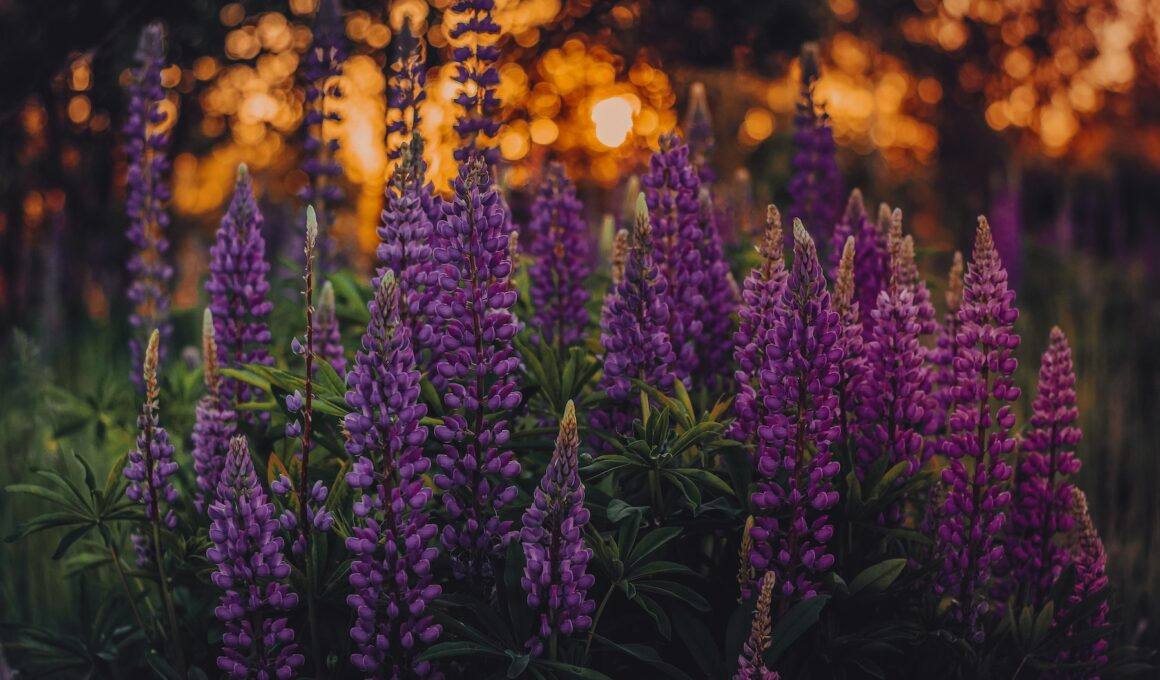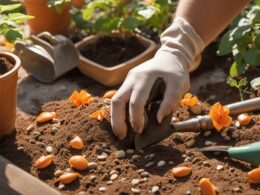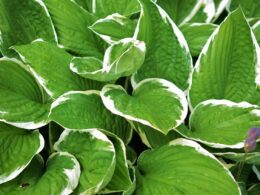Are you tired of finding your beautiful lupins destroyed by slimy slugs and snails? Do you want to protect your garden from these pesky creatures? Well, you’re in luck because there are several effective ways to keep slugs and snails off your lupins.
First, it’s important to understand the behavior of slugs and snails. These creatures are attracted to moist environments, and they feed on the leaves and stems of plants. They are most active at night and on cloudy, damp days. Knowing this, you can take steps to prevent them from accessing your lupins and causing damage.
Keep reading to learn about natural remedies, commercial products, and cultural practices that can help you protect your lupins from these garden pests.
Understand the Behavior of Slugs and Snails
To protect your beautiful lupins, it’s important to understand the behavior of slugs and snails. These slimy creatures are most active at night, hiding in dark, damp places during the day. They feed on a variety of plants, including lupins, which they particularly enjoy due to their soft foliage. Snails scrape away at leaves, while slugs leave behind a slimy trail as they eat.
To create an environment that is less attractive to slugs and snails, start by removing any hiding places in your garden. This can include piles of leaves or debris. You can also use copper strips or mesh around your lupins, which repel these creatures due to a reaction between their mucus and copper. Additionally, consider using organic slug and snail repellents, such as coffee grounds, eggshells, or crushed oyster shells.
By understanding the feeding habits and behavior of slugs and snails, you can take proactive steps to protect your lupins from being devoured.
Natural Remedies to Keep Slugs and Snails Away
If you’re looking for natural remedies to keep slugs and snails away from your lupins, there are a few things you can try. First, consider using coffee grounds as a deterrent.
Additionally, applying diatomaceous earth around the base of your plants can also help keep these pests at bay.
Finally, placing copper tape around the perimeter of your garden beds can be an effective way to prevent slugs and snails from crawling onto your lupins.
Use coffee grounds
Sprinkle some coffee grounds around your lupins to deter those pesky mollusks. Not only will this natural remedy keep slugs and snails at bay, but it’ll also provide your plants with a nutrient-rich soil amendment.
Here are some things to keep in mind when using coffee grounds in your garden:
- Pros: Coffee grounds contain high levels of nitrogen, which is essential for plant growth. They also have a slightly acidic pH, which can help to balance the alkaline soil often found in gardens.
- Cons: Although coffee grounds can be beneficial, too much of a good thing can be harmful. Overuse of coffee grounds can lead to soil becoming too acidic, which can damage your plants. Additionally, coffee grounds can attract other pests like ants or fruit flies.
- Alternative uses: If you’ve got excess coffee grounds, they can be used for other gardening purposes. They can be added to compost to speed up the decomposition process or used as a natural dye for fabrics.
By using coffee grounds, you can keep your lupins safe from slugs and snails while also providing them with essential nutrients. Just be sure to use them in moderation and keep an eye out for any unwanted pests.
Apply diatomaceous earth
To effectively protect your lupins from harmful mollusks, apply diatomaceous earth around the base of the plants. This will create a protective barrier that will deter pests from crawling up the stems and leaves. Diatomaceous earth is a natural substance made from the fossilized remains of diatoms, which are microscopic algae.
When slugs and snails come into contact with diatomaceous earth, the sharp particles in the substance penetrate their soft bodies and cause them to dehydrate and die. However, it’s important to note that diatomaceous earth can be harmful if ingested. So, it’s essential to keep it away from children and pets.
There are alternatives to diatomaceous earth that you can use if you’re uncomfortable using it. For example, you can create a barrier around your lupins using crushed eggshells or copper tape. These are both effective at deterring slugs and snails.
Whichever method you choose, the key is to be proactive in protecting your plants from these pesky mollusks. This way, you can enjoy a beautiful lupin garden all season long.
Place copper tape around plants
One way to protect your beautiful lupin garden is by placing copper tape around the base of your plants. This is a highly effective method that many gardeners have used for years. Here’s why copper tape is a great choice:
- It creates a physical barrier that slugs and snails can’t cross.
- Copper tape is non-toxic and safe for plants, animals, and humans.
- It’s easy to apply and doesn’t require any special tools.
- Copper tape is a long-lasting solution that can be reapplied as needed.
While copper tape is popular, you may also want to consider copper tape alternatives, such as using eggshells, coffee grounds, or even copper wire. However, it’s important to note that the effectiveness of these alternatives may vary. Ultimately, the best way to keep slugs and snails off your lupins will depend on a variety of factors, including your location, climate, and the severity of the slug and snail problem in your area.
Should I Cut Back Lupins After Flowering to Prevent Slug and Snail Infestation?
Cutting lupins after flowering can help prevent slug and snail infestations. By removing the spent blooms, you eliminate potential food sources for these pests. Also, cutting the lupins back encourages new growth and better airflow, making it harder for slugs and snails to hide and thrive.
Commercial Products for Slug and Snail Control
You’ll want to check out the commercial products listed here for a guaranteed solution to your lupin pest problem. These products are specifically designed to target slugs and snails and are highly effective at keeping them away from your plants.
While there is some debate about their overall effectiveness, many gardeners have found success with these products. One thing to consider when using commercial products for slug and snail control is their potential environmental impact. Some of these products contain chemicals that can be harmful to other wildlife in your garden.
Be sure to read the labels carefully and use these products responsibly to minimize any negative effects. Despite the potential environmental impact, commercial products for slug and snail control can be a great option for those struggling with a serious infestation.
They offer a quick and easy solution that can make a big difference in the health and appearance of your lupins. Just remember to use them responsibly and in moderation for the best results.
Cultural Practices to Reduce Slug and Snail Infestations
Now that you’ve learned about commercial products for slug and snail control, let’s talk about some cultural practices you can implement to reduce their infestation on your lupins. These practices involve changing the way you grow your plants to make them less attractive to these pests.
One of the simplest ways to reduce slug and snail infestations is by practicing crop rotation. This means planting lupins in a different location each year so that these pests don’t have a chance to build up a population. Additionally, rotating crops can help to reduce the risk of soil-borne diseases and help to maintain soil fertility.
Another effective cultural practice is companion planting. This involves planting different plants together that can help to repel or distract slugs and snails, such as herbs like thyme or oregano, or plants like garlic or onions. Alternatively, you can plant lupins alongside plants that attract beneficial insects like ladybugs or ground beetles, which can help to control slug and snail populations naturally.
By implementing these cultural practices, you can reduce the chances of slugs and snails infesting your lupins, making for a healthier and more productive garden. Remember, prevention is always better than cure, so it’s worth taking the time to plan and implement these practices early on in the growing season.
Long-Term Strategies to Prevent Slug and Snail Damage
If you want to prevent slug and snail damage in the long-term, there are a few key strategies you can use.
First, encourage natural predators such as birds, hedgehogs, and frogs to take care of any slugs or snails that may be lurking in your garden.
Second, develop a diverse garden that includes a variety of different plants and flowers, which will attract a wide range of insects and other creatures to help keep pests in check.
Finally, make sure to rotate your crops regularly to avoid creating a habitat that’s too hospitable to slugs and snails.
Encourage natural predators
By creating a welcoming environment for beneficial insects like ground beetles, birds, and hedgehogs, lupins can thrive without the need for harmful pesticides.
One way to encourage these natural predators is by planting predator-attracting plants such as yarrow or dill. These plants not only provide food and habitat for beneficial insects but can also repel slugs and snails with their strong scent.
Companion planting is another effective way to encourage natural predators. Planting lupins alongside herbs like basil or mint can attract beneficial insects that prey on slugs and snails.
Additionally, planting lupins near plants that are unattractive to slugs, such as geraniums or marigolds, can deter these pests from the area.
By incorporating these natural methods, you can keep slugs and snails off your lupins while promoting a healthy and sustainable garden ecosystem.
Develop a diverse garden
Having a diverse garden is crucial for promoting a healthy and sustainable ecosystem. When it comes to keeping slugs and snails off lupins, companion planting can be your best friend.
Planting different types of plants together can create a natural barrier against pests. For example, planting herbs like rosemary, thyme, and sage around lupins can repel slugs and snails. On top of that, herbs can also be used for cooking and medicinal purposes, making your garden truly multi-functional.
Soil health is also an important factor in keeping slugs and snails away from lupins. Healthy soil can promote the growth of strong and resilient plants, making them less susceptible to pests. One way to improve soil health is to add compost or organic matter to it. This can improve soil structure, retain moisture, and increase nutrient availability.
By developing a diverse garden with companion plants and improving soil health, you can create a natural defense against slugs and snails, while also promoting a thriving ecosystem.
Rotate crops regularly
Rotating crops regularly is a key strategy for maintaining a healthy and sustainable garden ecosystem, ensuring the long-term success of your lupins. Crop rotation benefits the soil by preventing the buildup of disease and pests that can harm your plants.
When the same crops are planted in the same spot year after year, they can deplete the soil of essential nutrients and encourage the growth of harmful organisms that feed on them. To avoid this, try rotating your crops every year or two. Here are some ideas to get you started:
- Group plants with similar nutrient needs together to make it easier to rotate them.
- Avoid planting the same family of crops in the same spot for more than two years in a row.
- Consider planting cover crops like clover or vetch in between crop rotations to improve soil health.
- Keep a record of where you plant each crop each year to help you plan your rotations in the future.
By following these simple tips, you can improve the health and productivity of your garden while keeping your lupins safe from slugs and snails. Not only will crop rotation benefit your plants, but it will also improve the overall health of your soil.
So, take the time to plan your crop rotations carefully and enjoy the benefits of a diverse and sustainable garden for years to come.
Frequently Asked Questions
Can companion planting help to deter slugs and snails from lupins?
Companion planting benefits go beyond just aesthetics. Planting certain flowers, herbs, and vegetables together can also help deter pests naturally.
For example, planting marigolds or garlic near your lupins can repel slugs and snails. These natural repellents are effective and safe for the environment, and can also add a pop of color to your garden.
So, if you’re looking for a way to keep your lupins pest-free without harmful chemicals, consider companion planting with natural repellents. Your garden will thank you, and you’ll have peace of mind knowing you’re doing your part for the environment.
Will using salt or copper tape harm the lupin plants?
Using salt or copper tape on lupins to deter slugs and snails may seem like a quick fix, but it can actually harm your plants. Salt can damage the soil and burn the leaves, while copper tape can interfere with the lupin’s growth and development.
The most effective way to protect your lupins from these pests is to use slug pellets specifically designed for the purpose. These pellets contain chemicals that are toxic to slugs and snails, but safe for the plant. Simply scatter them around the base of the lupin and replenish as needed.
This method isn’t just effective, but also safe for your plants. It ensures your lupins stay healthy and beautiful.
How often should I apply natural remedies to keep slugs and snails away from my lupins?
To keep slugs and snails away from your lupins, using natural repellents is a great option. However, the frequency of application is crucial to the effectiveness of the repellent. Experts recommend applying natural repellents every two weeks to keep the pests away.
Some natural remedies that work well include crushed eggshells, coffee grounds, and diatomaceous earth. These remedies not only repel the pests but also add nutrients to the soil.
So, if you want to save your lupins from being devoured by slugs and snails, make sure to apply natural repellents every two weeks.
Are there any specific cultural practices that should be avoided to reduce slug and snail infestations in lupins?
To reduce slug and snail infestations in your lupins, there are specific cultural practices that you should avoid. Firstly, avoid using pesticides as they can harm beneficial insects and animals. Instead, opt for organic solutions such as handpicking the pests, using copper tape or mesh, or placing traps.
Additionally, avoid overwatering your lupins as moist soil attracts slugs and snails. Instead, water your plants in the morning so the soil has time to dry throughout the day.
By implementing these practices, you can keep your lupins healthy and slug-free without harming the environment.
Is it possible to attract beneficial predators to my garden to naturally control slug and snail populations?
If you’re looking for organic solutions to keep slugs and snails off your lupins, consider attracting beneficial predators to your garden. These can include birds, hedgehogs, frogs, and toads.
You can attract birds by providing birdhouses and feeders, while hedgehogs, frogs, and toads can be attracted by creating a habitat with shelter, water, and food sources.
These predators can help naturally control slug and snail populations in your garden. By using this method, you can avoid the use of harmful chemicals and keep your garden healthy and thriving.
Conclusion
Congratulations! You now know how to keep slugs and snails off your lupins. By understanding the behavior of these pests, you can implement natural remedies or commercial products to keep them away.
Additionally, cultural practices like removing debris and avoiding overwatering can help reduce their infestations. But don’t stop there.
Long-term strategies like crop rotation, companion planting, and using slug-resistant varieties can prevent future damage and keep your lupins healthy for years to come.
With these tips, you can enjoy a beautiful garden without worrying about pesky slugs and snails munching on your lupins. Happy gardening!








